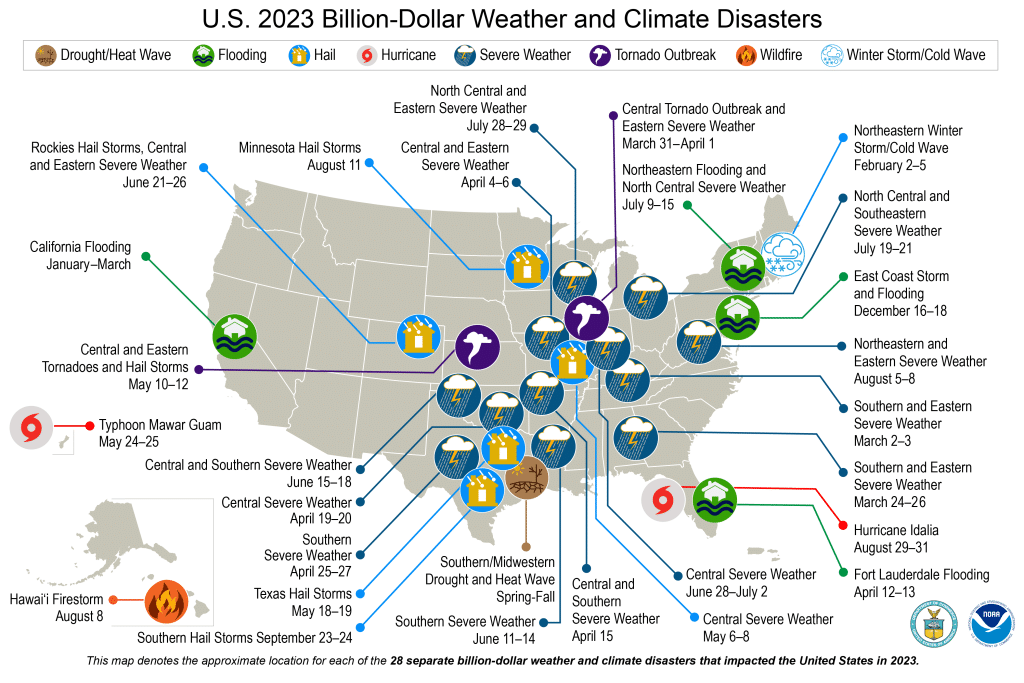This winter was the hottest ever recorded in nine US states, while 26 states saw their top-10 warmest winter.
—
This meteorological winter was the warmest on record in the US, the National Oceanic and Atmospheric Administration (NOAA) confirmed earlier this month.
The average temperature in December, January, and February was 37.6F (3.1C), 5.4F above average. Eight states – Iowa, Michigan, Minnesota, New Hampshire, New York, North Dakota, Vermont and Wisconsin – had their warmest winter on record, while winter temperatures were among the top-10 highest ever recorded across 26 additional states, according to the national weather agency.
The announcement came after February was confirmed the third-warmest in the US since records began 130 years ago, with an average temperature of 41.1F (5.05C). Last month was also the hottest February worldwide and the ninth month consecutively that recorded temperatures for a particular month have reached unprecedented levels.
Extreme Events
These climate anomalies are leading to a cascade of extreme weather events across the nation.
Prolonged above-average temperatures are aggravating drought conditions in the US, with 21.6% of the country in a drought as of February 27. Meanwhile, the US Great Lakes – Superior, Michigan, Huron, Erie, and Ontario – experienced a steady decrease in ice coverage in recent months, which reached 2.7% on February 11, a historic low for mid-February.
Unseasonably warm temperatures combined with a cold front fueled powerful storms in the Upper Midwest, affecting Iowa, Illinois, and Wisconsin, with the latter experiencing its first-ever February tornado.
On the West Coast, a series of atmospheric rivers resulted in torrential rain in parts of California, which led to widespread flooding, landslides, and power outages. Warmer temperatures can contribute to the formation and intensification of atmospheric rivers, moisture corridors in the atmosphere that transport water vapor from the tropics to higher latitudes. Warmer temperatures increase evaporation, leading to more moisture in the atmosphere and thus fueling their formation and strength.
More on the topic: The Science Behind Atmospheric Rivers
Since January 1, the US has seen one confirmed weather event – a severe storm affecting the East Coast in January – resulting in losses exceeding $1 billion, though the number is destined to increase.
A new assessment by Zurich-based reinsurance company Swiss Re published last month revealed that the US and the Philippines pay the highest annual price from climate change-driven extreme weather events in relation to their gross domestic product (GDP).
According to government figures, the US saw 28 billion-dollar natural disasters in 2023, with combined costs exceeding $92 billion. The year prior was the nation’s third-costliest year ever for climate disasters, with a total of 18 major climate disasters collectively racking up $165 billion in damages and claiming 474 lives.

Unfolding Trend
2023 was the hottest year on record, supercharged by the return of the El Niño, a weather phenomenon that has pushed temperatures off the charts around the world and that is expected to last well into 2024.
Last month, Copernicus confirmed that the critical 1.5C global warming threshold set in the Paris Agreement was breached over a twelve-month period for the first time in history, with global temperatures at 1.52C above the 19th century benchmark. While this does not signal a permanent breach of the limit, which scientists say is measured over decades, it sends a clear warning to humanity that we are approaching the point of no return much faster than expected.
According to the United Nations, the world is on track to warm well above 2C and we are running out of time to make the transformational changes required to cap global temperature rises.
Commenting on the latest findings, Carlo Buentempo, Director of C3S, said February’s record-breaking temperatures were “not really surprising.”
“The climate responds to the actual concentrations of greenhouse gases in the atmosphere so, unless we manage to stabilise those, we will inevitably face new global temperature records and their consequences,” Buentempo said.
According to the latest analysis on global carbon dioxide (CO2) levels by the International Energy Agency (IEA), global CO2 emissions grew by 410 million tonnes – or 1.1% – in 2023, reaching a historic high of 37.4 billion tonnes. This was partly due to a global shortfall in hydroelectric power generation linked to historic droughts that have affected many regions of the world, which drove up emissions from fossil fuels by an additional 170 million tonnes. Without it, the agency said, global emissions would have likely declined last year.
Featured image: fosco lucarelli/Flickr


















